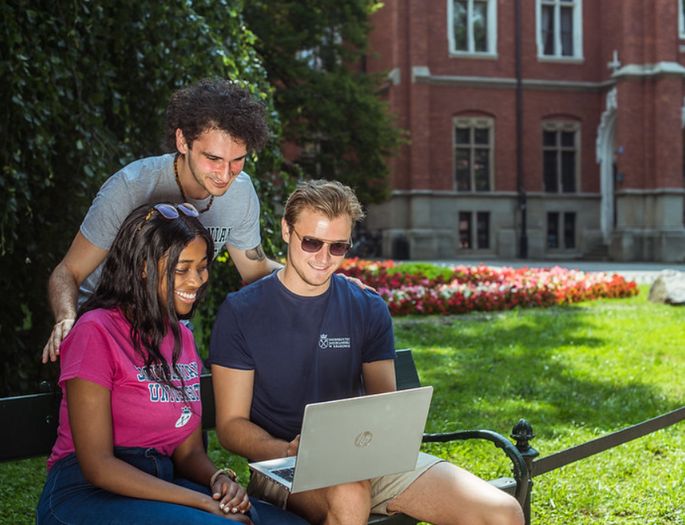
Is the modern world experiencing a crisis of values? Here is a conversation with Dr hab. Małgorzata Bogunia-Borowska, head of the Department of Modern Culture at the Jagiellonian University Institute of Sociology.
You are the editor of the book Fundamenty dobrego społeczeństwa. Wartości [The Foundations of a Good Society. Values], published by Znak. What led to your interest in the topic of values?
For a sociologist, the topic of values is a very important one. And given that we live in very dynamic times and are experiencing many processes and changes, it is natural for questions to crop up regarding what kind of world we live in today and what it will be like tomorrow. There's no getting away from the fact that it's increasingly hard to comprehend what's going on around us. In many places, there is armed conflict, mass migrations, cultures are mixing, and there is a clash of various visions of how this world should be built. We are seeing confrontations of various religious systems and lifestyles, social inequalities are being emphasised, the existing constant myths and cultural, historical and social narratives are being questioned. What has so far been the preserve of enquiries by intellectuals is becoming the experience of ordinary people.
We are living at a very strange historical moment. People have access to modern technologies, they can travel around the globe with ease, communicate with the furthest-flung corners of the world thanks to the satellites orbiting above us, and medical progress is effectively extending human life. And yet, rather than building a good and safe world, in which everybody can feel good, they are doing quite the opposite. Instead of dialogue and communication we have a growing number of conflicts. Contemporary civilisation is heading in an unknown direction. The future is uncertain.
Do values take on a particular significance at such times?
Values are important at all times. But indeed, one has the sense right now that "there's something in the air". Something is happening that we are as yet unable to rationalise and evaluate. The social models that we understand and know need to be retested and reinterpreted. People need to understand the world in which they live. The world that they too create. They have to have a vision of it. In their daily lives they need to be able to respond and judge what is good and what is bad. What helps them and what threatens them. What is good for the community they live in and what can harm it.
People living in times marked by such extremely dynamically diverse processes as globalisation and migration have a particular need for signposts, models and patterns of action. If there are no ready procedures for reacting and solving various problems, crisis ensues, and with it anxieties, concerns and fears. People lose their sense of what Anthony Giddens calls ontological security.
This is a situation of a global nature. Is there a remedy?
It's very difficult, because to look for a cure you first need to make an accurate diagnosis. Today we know and "feel" the sickness, but we are still unable to diagnose it properly. So we can't talk about curing it yet. To leave that medical metaphor behind, one might say that the social, political or cultural order known in Europe is "bursting" and "collapsing". Everything in the world is "creaking". It seems as if our world is not ready for what is happening now. In this case one possibility is to refer to the social foundations, to what lies at the basis of the community: values or ideas.
Is there a shortage of ideas uniting people or designating the horizon of actions for people, social groups or entire communities?
More and more, people live in their private spaces. For some of us that is absolutely enough. That kind of life can make them happy, especially when this is a constant state. If we look at the development of civilisation, though, it's easy to see that there are societies that live in the everyday, and those searching for a Great Idea. For some, democracy and individualism are enough. Others are unable to organise themselves without the signposts given by an ideology or religion. This second type is described superbly by this year's Nobel Prize winner Svetlana Alexievich, who traverses the vast expanse of the former Soviet Union and studies the people living in these lands. She talks to Turkmens, Ukrainians and Kazakhs who are unable to live without a Great Idea. She comments on this state with the words: "They couldn't just walk away from History, leaving it all behind and learning to live without it – diving head first (…) and dissolving into private existence, like so many others who now allowed what used to be minor details to become their big picture (Secondhand Time: The Last of the Soviets).
From your description, two models of community clearly emerge.
Yes. We could call these two models "great idea communities" and "great everyday life communities". The first type of society is organised around an extraordinary idea which can be fulfilled only on a grand scale and with the involvement of all community members. The very idea acts to foster the endurance of the community and inspire a sense of pride in it. The second type of community is characterised by the ordinariness of painstakingly constructed good everyday life in relations with family, neighbours, institutions and other citizens. This second model is less spectacular. It engages all members to a greater extent in creating a common good in the everyday areas of human existence. It avoids pathos and sublimity in favour of ordinary but valuable life in all its contexts and dimensions. In the history of development of societies, these two types of community – that of the great idea and great everyday life – appear interchangeably.
In the Polish traditions, they are identified with two movements: Romanticism and Positivism. First a community concentrates around a grand and serious idea, before in the next phase involving the members of the community in positivistic and pragmatic work on its behalf. Organising the community in a "Romantic" or "Positivist" way works like a kind of rotation. One of the biggest challenges would seem to be for these two types of community to exist at the same time. To have an important and symbolic idea that frees social energy to act, while at the same time every day its members engage in practical and systematic effort. So it's about combining ideological thinking with pragmatic action.
But a society is not just a community, but also a societas. Is one of these dimensions more important from the point of view of the functioning of a society?
In sociological thought, the divide into communitas and societas is a very persistent one. It appears, for example, in Ferdinand Tönnies and Émile Durkheim. Essentially every society consists of two dimensions: the communitas and the societas. The community expresses values, i.e. everything that unites people in the symbolic and cultural dimension. Societas, meanwhile, is expressed in the structures and institutions, that is everything that bonds people together and organises their lives in the formal dimension. The realm of communitas is less formalised and institutionalised, but also based on the principle of incalculable mutuality. The optimal situation would be if there was a balance between these dimensions.
Is it possible, then, to have a world – or, in sociological terms, a social order – without values?
I find it hard to imagine that kind of world, or community. A world without the good values described in the book – which we defined as dignity, loyalty, love, responsibility, industry, integrity, friendship, decency, solidarity, justice, respect, honesty, freedom, sensitivity, cooperation, trust and kindness – would be a caricature. It would be awful, an unbearable nightmare. It's also worth bearing in mind that people are able to distort the positive meaning of these beautiful, fundamental concepts. By defining them in their own way, they can build regimes and make life hell for people. But situations like that have nothing to do with good societies.
The social contract is based on social values. It is on their foundation that social order is formed, the lives of individuals are organised, but also the quality of community life is shaped.
There is also the question of the choice of these values. Józef Tischner taught us that values "are not poured upon us from above, like water from a bottle. They too require a choice from us (Przekonać Pana Boga [To Persuade God]). This choice is not always obvious. In some social contexts it is more worth people's while, especially in the short term, to be dishonest or irresponsible.
It seems as if today there's a desire to negotiate the meaning of values a little.
Social values can't be negotiated. They can't be stretched like chewing gum. One can't be a little honest, or sometimes kind, for example when it's good business. You're either honest and kind, or not. Either you respect another person and are responsible, or not. In the book the metaphor of the DNA of the social fabric was used. It is what this DNA code is constructed from that determines the character and actions of the entire social organism. One can inherit this code, but one can also – although this is harder – try to modify it.
Each of us is able, without too much difficulty, to point to social spaces where people want to live and spend time. There are places in which we feel good straightaway. Places where people fulfil their needs, work together, help each other and respect each other. And there are also communities which people leave and from which they flee. Communities in which life becomes unbearable, and people have no opportunities for development, for cooperation. Places where people don't want to raise children. These are the places where the DNA of the social fabric is most clearly defective.
How can we recognise a good community?
It's very straightforward. In a good community people simply feel good. They want to stay there, do something for it, and bring up children there. It has a transparent order, based on constant rules. People flee from bad communities. They look for a better world for their children. They often take action to change them.
There is one more way of checking if a community was good: the memory of it. A certain kind of longing for it, a sense of gratitude towards it for who you are and what it has given you. Gratitude, or obligation, towards and in a community helps it to last and be strong. As Georg Simmel wrote, "this atmosphere of obligation belongs among those ‘microscopic', but infinitely tough, threads which tie one element of society to another, and thus eventually all of them together in a stable collective life ("Faithfulness and Gratitude" in The Sociology of Georg Simmel). This is why, even if one does not live in a community at a given moment or has already left it, one remains part of it. For example, the Jagiellonian University community is not just its current students and staff, but people scattered around the world who once entered it and took on its values. It is also those who have departed. Their memory is an important aspect of it. What is also important is whether, when we think about a community, we do so in terms of "us".
So a world without values is impossible?
A world without values is possible, but it would be hell. And there would certainly be no room in it for a community.
Thank you very much.
Interview by Iwona Kołodziej
The interview was originally published in the Polish version of Alma Mater monthly of the Jagiellonian University (issue No. 182-183).





